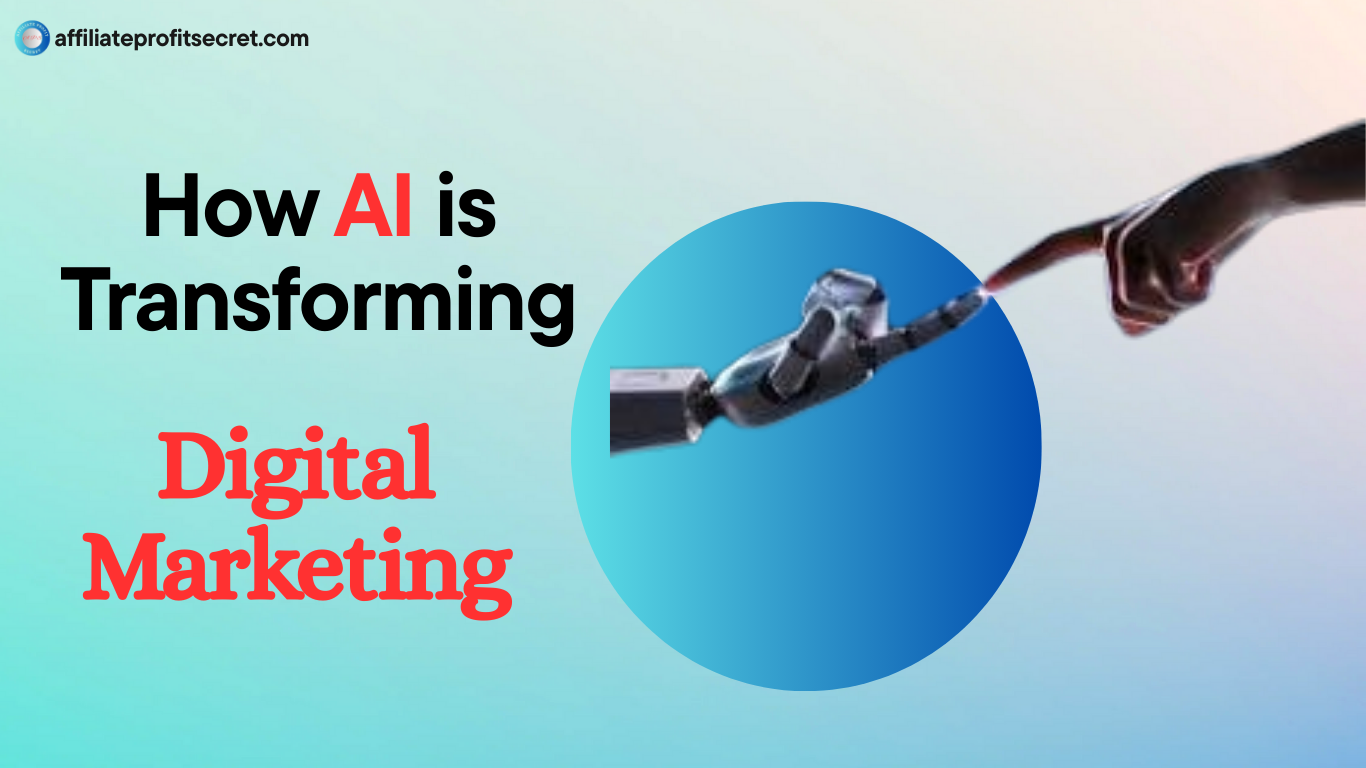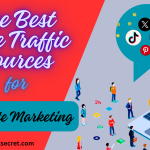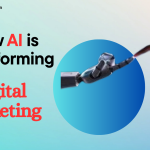Welcome to my article on “How AI is Transforming Digital Marketing”. In the world of digital marketing, change is the only constant—and right now, AI is the ultimate game-changer. Once viewed as a futuristic concept, Artificial Intelligence is now fully embedded in marketing strategies, transforming everything from content creation to customer engagement. If you’ve ever wondered how your favorite brand seems to “just know” what you want to buy or how your inbox is suddenly full of personalized offers, you can thank AI for that. Gone are the days of guesswork and cold outreach; AI is here to make marketing smarter, faster, and, dare we say, a little more fun.
While AI may sound like something straight out of a sci-fi movie, it’s very much a present-day tool that is revolutionizing the digital marketing landscape. From automated content creation to predictive analytics and AI-powered chatbots, the possibilities are endless. AI not only saves marketers time by automating repetitive tasks but also helps them make data-driven decisions that lead to better-targeted ads, higher engagement rates, and a more personalized customer experience. In this article, we’ll dive into how AI is shaking up the marketing world, how businesses are using it to stay ahead, and why, if you’re not already on the AI bandwagon, you might want to hop on before it leaves you behind.
My Best Recommended & Proven Way to Make $100-$300 Daily – Watch This FREE Video to START >>>

AI-Powered Content Creation & Personalization
Gone are the days when content marketing relied solely on human writers tirelessly churning out blog posts, social media updates, and email campaigns. While creativity is still at the heart of great content, Artificial Intelligence (AI) has become the ultimate assistant, helping marketers produce high-quality, personalized content at scale. Whether it’s writing blog posts, generating ad copy, or crafting engaging email subject lines, AI-powered tools are making content creation faster, smarter, and more data-driven than ever.
Take AI writing assistants like ChatGPT, Jasper, and Copy.ai—these tools analyze tons of online content, understand language patterns, and generate well-structured, engaging text in seconds. Need a catchy headline? Done. A full-fledged product description? No problem. Of course, AI isn’t here to steal the jobs of content creators (yet), but rather to enhance efficiency, reduce writer’s block, and allow marketers to focus on strategy rather than repetitive tasks.
Platforms like Amazon, Netflix, and Spotify use AI to analyze user behavior, recommend content, and tailor product suggestions with eerie accuracy (yes, Netflix knows you’re about to binge-watch that new series before you do). In marketing, this means AI can dynamically customize email content, suggest relevant blog topics, and even adjust website experiences based on user preferences.
For affiliate marketers, AI-powered personalization can be a game-changer. By leveraging AI-driven analytics and recommendation engines, marketers can serve the right content to the right audience at the right time, significantly boosting engagement and conversions. The result? Happier customers, higher click-through rates, and ultimately, more commissions. In short, AI isn’t just a futuristic concept—it’s already revolutionizing how content is created, personalized, and consumed, and savvy marketers are using it to gain a serious competitive edge.
AI in SEO & Search Algorithms
SEO used to be all about stuffing keywords, building backlinks, and hoping Google would reward your efforts. But today? AI has completely reshaped the way search engines rank content, and marketers who don’t adapt risk being left in the digital dust. With Google’s AI-driven updates like RankBrain, BERT, and MUM, search engines have evolved from simple keyword-matching machines into highly intelligent systems that understand context, intent, and even natural language nuances. In short, SEO is no longer just about keywords—it’s about relevance, quality, and user experience.
One of the biggest game-changers in AI-driven SEO is Google RankBrain, which uses machine learning to analyze search queries and deliver the most relevant results. Instead of just matching keywords, RankBrain focuses on user intent, meaning that if your content doesn’t actually answer the question users are asking, it won’t rank—no matter how many keywords you cram in.
My Best Recommended & Proven Way to Make $100-$300 Daily – Watch This FREE Video to START >>>
Platforms like SurferSEO, Clearscope, and Frase use AI to analyze top-ranking content, suggest semantic keywords, and optimize on-page elements in ways that align with Google’s algorithms. And let’s not forget voice search and visual search, both of which are powered by AI. With the rise of Siri, Alexa, and Google Assistant, people are searching in a more conversational way, and AI is ensuring search engines keep up. Meanwhile, platforms like Google Lens are making image-based search a reality, meaning SEO strategies now need to consider alt text, structured data, and AI-friendly content formats.
At the end of the day, AI in SEO isn’t something to fear—it’s a tool that, when leveraged correctly, can help marketers create smarter, more optimized content that ranks higher, reaches the right audience, and drives real engagement.
AI-Powered Chatbots & Customer Engagement
Remember the days when getting customer support meant waiting on hold for what felt like an eternity, only to be transferred to yet another agent who “understands your frustration”? Thankfully, AI-powered chatbots have changed the game, offering instant, efficient, and often surprisingly human-like responses. These digital assistants don’t take breaks, don’t get frustrated, and—best of all—don’t make customers listen to elevator music while they wait.
Brands today use AI chatbots to handle everything from answering FAQs to guiding users through the buying process. Tools like Drift, ManyChat, and HubSpot’s chatbot can engage potential customers, recommend products, and even help with order tracking—all in real time. The result? Faster response times, improved user experience, and higher conversion rates. And let’s not forget conversational marketing, where chatbots don’t just answer questions but actively engage users, offering personalized recommendations based on browsing behavior. It’s like having a sales rep available 24/7, minus the commission.
But AI chatbots aren’t just about quick replies—they’re learning and adapting with every interaction. Thanks to Natural Language Processing (NLP) and machine learning, advanced bots like ChatGPT, IBM Watson Assistant, and Google’s Dialogflow can understand complex queries, detect customer sentiment, and even escalate conversations to human agents when necessary. In fact, some AI-driven customer support systems can predict user needs before they even ask—offering proactive solutions based on past interactions. Talk about next-level service!
For businesses, AI-powered chatbots mean reduced operational costs, improved lead generation, and better customer retention. For customers, it means getting instant support without the hassle of long wait times or robotic-sounding responses. Whether it’s an e-commerce site recommending the perfect product or a SaaS company troubleshooting issues in real time, AI chatbots are redefining customer engagement—and they’re only getting smarter.
AI in Predictive Analytics & Ad Targeting
Ever feel like the internet knows you a little too well? Like when you casually mention a product in conversation, and suddenly, it’s all over your social media feed? That’s not magic—it’s AI-powered predictive analytics and ad targeting working behind the scenes. AI doesn’t just collect data; it analyzes patterns, predicts future behavior, and ensures ads land in front of the right people at the right time. And let’s be honest—no one likes seeing irrelevant ads (looking at you, random insurance ads when you don’t even own a car).
So how does AI make ad targeting so precise? Machine learning algorithms analyze massive amounts of data, including user demographics, browsing habits, past purchases, and even engagement patterns. AI helps marketers refine their audience down to highly specific segments, making campaigns far more effective.
Then there’s predictive analytics, which takes things a step further. AI doesn’t just react to what customers have done—it anticipates what they will do next. Platforms like HubSpot, Salesforce, and Adobe Sensei use AI to predict buying behavior, determine the best times to send ads, and even forecast trends before they happen. For example, AI can detect when a customer is about to churn and trigger a personalized offer to keep them engaged. Or, it can identify which leads are most likely to convert, so sales teams don’t waste time chasing cold prospects.
My Best Recommended & Proven Way to Make $100-$300 Daily – Watch This FREE Video to START >>>
At the end of the day, AI is making digital advertising smarter, more efficient, and (thankfully) less annoying. Instead of bombarding users with generic ads, businesses can use AI to deliver highly relevant, well-timed, and engaging campaigns that actually convert. And with AI constantly evolving, one thing is certain: the days of guesswork in advertising are over—data-driven precision is here to stay.
Challenges & Future of AI in Digital Marketing
AI in digital marketing feels like a superpower—automating tasks, predicting customer behavior, and personalizing content like never before. But even superheroes have their kryptonite, and AI is no exception. While the potential is enormous, marketers still face significant challenges in leveraging AI effectively.
Challenges of AI in Digital Marketing
- Data Privacy & Ethical Concerns
AI thrives on data, but with great data comes great responsibility. Regulations like GDPR and CCPA have made it clear that businesses can’t just collect and use customer data however they please. Brands must find a way to leverage AI without crossing ethical boundaries or losing consumer trust. - AI Bias & Accuracy Issues
AI is only as good as the data it’s trained on, and biased data leads to biased outcomes. If AI algorithms rely on incomplete or skewed data, they can end up making poor marketing decisions, excluding certain audiences, or even reinforcing harmful stereotypes. - Cost & Implementation Barriers
While AI has the potential to revolutionize digital marketing, it’s not always cheap or easy to implement. Many AI-powered tools require significant investment, both in terms of money and expertise. Small businesses, in particular, may struggle to integrate AI solutions due to high costs, lack of technical know-how, or simply not knowing where to start. As AI technology advances, accessibility and affordability will be key factors in widespread adoption.
The Future of AI in Digital Marketing
Despite these challenges, the future of AI in digital marketing looks incredibly promising. Here’s what we can expect in the coming years:
- Even Smarter AI-Powered Personalization
AI is already personalizing emails, product recommendations, and ad targeting, but the future will bring hyper-personalization at an unprecedented scale. AI will predict not just what users want, but when they want it, fine-tuning messaging in real-time based on individual behavior and preferences. Think of it as marketing that reads your mind—without being creepy (hopefully). - AI-Generated Content That’s (Almost) Human
AI-powered content creation is improving at a rapid pace. Future advancements in Natural Language Processing (NLP) will make AI-generated blog posts, video scripts, and even social media captions virtually indistinguishable from human-written content. AI won’t replace content creators entirely, but it will serve as an indispensable tool for scaling content production without sacrificing quality. - The Rise of AI-Driven Voice & Visual Search
As voice assistants like Siri, Alexa, and Google Assistant become more sophisticated, voice search optimization will be a crucial part of SEO strategies. Similarly, visual search (think Google Lens and Pinterest Lens) will change how users discover products, making image-based SEO and AI-powered product recognition essential for digital marketers.
Conclusion
AI isn’t just a buzzword in digital marketing—it’s a game-changer. From automating content creation to predicting customer behavior and optimizing ad targeting, AI is reshaping how brands connect with their audiences. Gone are the days of generic marketing campaigns and one-size-fits-all messaging. Today, AI-driven tools are making marketing smarter, faster, and more personalized than ever before.
But let’s be real—AI isn’t perfect. Privacy concerns, ethical dilemmas, and the occasional AI hiccup (like bizarre chatbot responses or questionable content suggestions) remind us that technology still needs a human touch. The key to success isn’t blindly relying on AI but leveraging its power while maintaining strategic oversight and creativity. Marketers who find the sweet spot between automation and authenticity will have a major advantage in the AI-powered future.
My Best Recommended & Proven Way to Make $100-$300 Daily – Watch This FREE Video to START >>>
So, what’s next? Expect AI to become even more intuitive, predictive, and seamlessly integrated into every aspect of digital marketing. Whether it’s hyper-personalized customer journeys, voice and visual search dominance, or cookieless ad targeting, the future belongs to those who adapt. The brands that embrace AI while staying true to their unique voice and values won’t just keep up—they’ll lead the way.
Thanks a lot for reading my article on “How AI is Transforming Digital Marketing″ till the end. Hope you’ve helped. See you with another article.










